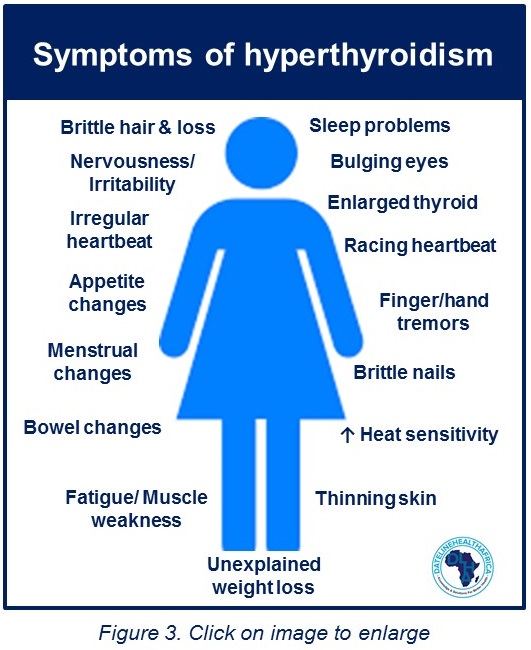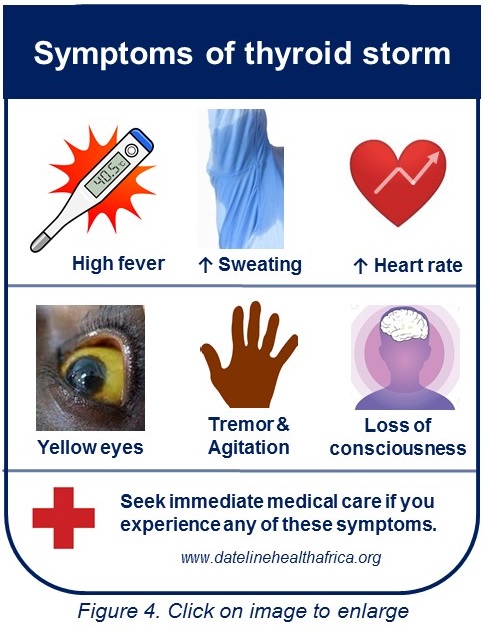By: Doreen Udoudom. Datelinehealth Africa Volunteer Freelance Writer, with editorial support from The DLHA Team
Hyperthyroidism simply means an overactive thyroid gland. An overactive thyroid is one that releases too much of its products into the bloodstream.
Before discussing what hyperthyroidism is, let us get familiar with the thyroid gland and what it does.
.jpg) The thyroid gland is a butterfly-shaped gland located in front of the windpipe (trachea) at the base of the neck (see figure 1). It produces two hormones, namely triiodothyronine (T3) and tetraiodothyronine or thyroxine (T4). The production of these hormones are under the control of a master hormone controlling gland at the base of the brain called the anterior pituitary gland. This gland itself is also under the control of a part of the brain called the hypothalamus. There is a dynamic functional relationship between these three structures as depicted in figure 2.
The thyroid gland is a butterfly-shaped gland located in front of the windpipe (trachea) at the base of the neck (see figure 1). It produces two hormones, namely triiodothyronine (T3) and tetraiodothyronine or thyroxine (T4). The production of these hormones are under the control of a master hormone controlling gland at the base of the brain called the anterior pituitary gland. This gland itself is also under the control of a part of the brain called the hypothalamus. There is a dynamic functional relationship between these three structures as depicted in figure 2.
The thyroid hormones are responsible for metabolic or energy-producing processes in the body.
They support the rate at which the body breaks down fats and carbohydrates for energy.
They help control body temperature and heart rate. And also help to control how much protein the body makes.
When there is excess production of thyroid hormones, it accelerates the body's metabolism leading to a variety of symptoms like insomnia (poor sleep duration and quality), irregular heartbeat and weight loss.
Hyperthyroidism can affect both males and females, but it is more common in women and people aged 60 and above.
This article discusses the causes, symptoms, diagnosis and treatment of hyperthyroidism.
There is no comprehensive report to date on the prevalence of hyperthyroidism in the Nigerian population.
A small retrospective study carried out from January 2016 to January 2019 in the outpatient department of the University of Nigeria Teaching Hospital, Enugu, Southeastern Nigeria indicated a prevalence rate of 1.4% for hyperthyroidism caused by Graves’ disease. More research is needed to identify the true burden of hyperthyroidism in the Nigerian population.
Hyperthyroidism can be caused by the following:
This is the most common cause of hyperthyroidism worldwide, including Nigeria.
Graves’ disease is an autoimmune condition in which there is an overproduction of TSI (thyroid-stimulating immunoglobulin). This hormone attacks the thyroid gland leading to excess production of thyroid hormones.
Some symptoms of hyperthyroidism may mimic the symptoms of many other disorders. This makes the condition difficult to diagnose.
 Some of the common symptoms of hyperthyroidism include:
Some of the common symptoms of hyperthyroidism include:
It is very important to visit with your doctor promptly for a checkup, if you notice a swelling in front of your neck, no matter how small it is, or have any of the following symptoms like;
Be sure to keep a diary of your symptoms so that you can provide your doctor with accurate details of your symptoms, including the time of onset, duration, severity, things that bring your symptoms up and things that make the symptoms go away even if temporarily. Also, let your doctor know about all medications that you are taking and if you have a family history of similar conditions.
Hyperthyroidism is not life-threatening but when left untreated, it can lead to severe adverse effects or complications. Some of these include:

Symptoms of thyroid storm include:
If you or anyone you know suffers any of the symptoms listed for thyroid storm, take the person to a hospital or doctor immediately to get the urgent treatment they need.
If you notice you have symptoms like an enlarged thyroid gland and fear that you have hyperthyroidism, talk to your doctor.
You will be physically examined and asked questions about your medical history, family history and other symptoms you've experienced.
For a more accurate diagnosis, you may be asked to undergo the following:
If your healthcare provider diagnoses you with hyperthyroidism, they may recommend these types of treatments to you:
The treatment option that you will likely get depends on the availability of care resources and health insurance in your healthcare environment, the severity of your illness, the presence of contraindications to a particular treatment modality, and your treatment preference.
Prevention of hyperthyroidism will be discussed at public and individual levels.
At the individual level, hyperthyroidism is not preventable, but mild symptoms due to the condition can be reduced by engagement in the following activities:
At the public level, hyperthyroidism is also not preventable, but the following interventions will go a long way to identify and provide the population at risk of the condition with the care that they need.
The economic impact of hyperthyroidism in Nigeria is significant. This disorder can lead to reduced productivity due to some of its symptoms and complications if it is not detected early.
For those who require treatment with antithyroid medication or surgery, the money may not be readily available.
To deal with the economic impact of hyperthyroidism in Nigeria, it is important to create awareness about the disorder and put measures in place to promote healthy living and access to care.
Hyperthyroidism is a condition caused by the overproduction of thyroid hormones into the bloodstream.
Early diagnosis and appropriate treatment are important for managing symptoms, preventing adverse effects and maintaining a healthy life.
With the right treatments and aftercare, people with hyperthyroidism can effectively manage their condition and lead healthy lives.
Related:
Goitre in Nigeria: What you need to know.
Abdulslam K, Yahaya IA. Prevalence of thyroid dysfunction in gestational hypertensive Nigerians. Sub-Saharan Afr J Med 2015; 2:19-27.
De Leo S, Lee SY, Braverman LE. Hyperthyroidism. Lancet. 2016 Aug 27;388(10047):906-918. doi 10.1016/S0140-6736(16)00278-6.
Okafor EN, Ugonabo MC, Chukwukelu EE, Okonkwo IN, Ezigbo E, Odurukwe O. Prevalence and Pattern of Thyroid Disorders among Patients Attending University of Nigeria Teaching Hospital, Enugu, Southeastern Nigeria. Niger Med J. 2019 Mar-Apr;60(2):62-67. doi: 10.4103/nmj.NMJ_34_19.
Okpara HC, et al. Spectrum of Thyroid Dysfunction among Patients Evaluated by Thyroid Function Tests at a Tertiary Clinical Laboratory in Calabar, Nigeria. Ann Med Health Sci Res. 2017; 7: 411-417.
Pokhrel B, Aiman W, Bhusal K. Thyroid Storm. In: StatPearls. Treasure Island (FL): StatPearls Publishing; Updated Oct. 6, 2022. Accessed May 13, 2023.
Published: May 17, 2023
© 2023. Datelinehealth Africa Inc. All rights reserved.
Permission is given to copy, use and share content without alteration or modification and subject to attribution as to source.
DATELINEHEALTH AFRICA INC., is a digital publisher for informational and educational purposes and does not offer personal medical care and advice. If you have a medical problem needing routine or emergency attention, call your doctor or local emergency services immediately, or visit the nearest emergency room or the nearest hospital. You should consult your professional healthcare provider before starting any nutrition, diet, exercise, fitness, medical or wellness program mentioned or referenced in the DatelinehealthAfrica website. Click here for more disclaimer notice.